|
Fall, Issue #8
News from Act Early Network Partners AUCD's 2015 Annual Report Release!
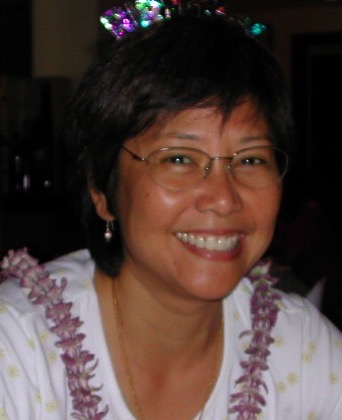 In the recently released Association of University Centers on Disabilities 2015 annual report, AUCD highlights six people who exemplify what it means to be an AUCD member. Their stories of leadership, scholarship, teaching, research, family, and personal achievement are but a small sampling of the activities that happen at AUCD member centers and programs across the country every day. To read their inspirational stories, please click here. In the recently released Association of University Centers on Disabilities 2015 annual report, AUCD highlights six people who exemplify what it means to be an AUCD member. Their stories of leadership, scholarship, teaching, research, family, and personal achievement are but a small sampling of the activities that happen at AUCD member centers and programs across the country every day. To read their inspirational stories, please click here.
JoAnn Yuen, the Director of the Center on Disability Studies at the University of Hawaii who has been a member of the AUCD network since 1999 and a Learn the Signs. Act Early Ambassador since 2010 is featured in the annual report. JoAnn is a pioneer of the Act Early initiative, and has been a part of the evolution of the program into the state-level Act Early Ambassador model that aims to increase developmental screening and the identification of developmental disabilities and Autism. Act Early Ambassadors identify early detection needs in their state, and JoAnn became the change agent in her state who cultivated a relationship with Hui Kupaa to utilize the Collective Impact Model to develop a state-wide system of developmental screening in Hawaii. Please continue reading about JoAnn's accomplishments here.
Promising Practices for Learn the Signs. Act Early.
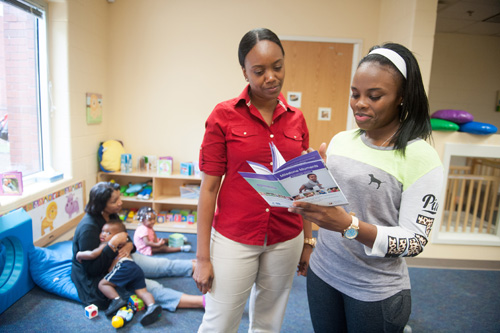 The Learn the Signs. Act Early. Promising Practices is a collection of locally inspired models and ideas that have been implemented and evaluated to varying degrees in programs and communities. A promising practice helps spread the reach of the LTSAE campaign and has the potential to positively impact families with young children and the organizations, health care professionals, and early care and education providers who serve them. Many of the activities in this collection represent the work of Act Early Ambassadors and State Systems grantees who found creative and effective solutions for implementing Learn the Signs. Act Early. with greatest potential impact using very modest resources. The Learn the Signs. Act Early. Promising Practices is a collection of locally inspired models and ideas that have been implemented and evaluated to varying degrees in programs and communities. A promising practice helps spread the reach of the LTSAE campaign and has the potential to positively impact families with young children and the organizations, health care professionals, and early care and education providers who serve them. Many of the activities in this collection represent the work of Act Early Ambassadors and State Systems grantees who found creative and effective solutions for implementing Learn the Signs. Act Early. with greatest potential impact using very modest resources.
How can you adopt and adapt Promising Practices activities in your local programs and communities to promote awareness of the importance of tracking developmental milestones and acting early on concerns? Please click here to view Promising Practices strategies by the target audience they reach. Which target audience can you help reach and deliver a Promising Practice activity to?
The CDC Welcomes New Health Communication Fellow to Support Act Early Initiatives
 Please join the Learn the Signs. Act Early Team in warmly welcoming new ORISE Health Communication fellow, Ms. Karnesha Slaughter, MPH, to the Division of Birth Defects and Developmental Disabilities, Prevention Research Branch. Karnesha was born and raised in the Metro Atlanta area. She received her Master of Public Health degree from Tulane University's School of Public Health & Tropical Medicine (2012) and her Bachelor of Science degree in Biobehavioral Health from The Pennsylvania State University (2011). She has expertise in developing and implementing evidence-based programs in the areas of youth development, child injury prevention, and health education. For the past two and a half years she has worked at the Clayton County Board of Health in a variety of roles from Injury Prevention Coordinator to Community Wellness Manager. In her free time she enjoys learning random facts, reading books, listening to music, and finding new places to brunch around Atlanta. Karnesha will be providing additional support to the Act Early Ambassador Program and other Act Early Network Activities. Please join the Learn the Signs. Act Early Team in warmly welcoming new ORISE Health Communication fellow, Ms. Karnesha Slaughter, MPH, to the Division of Birth Defects and Developmental Disabilities, Prevention Research Branch. Karnesha was born and raised in the Metro Atlanta area. She received her Master of Public Health degree from Tulane University's School of Public Health & Tropical Medicine (2012) and her Bachelor of Science degree in Biobehavioral Health from The Pennsylvania State University (2011). She has expertise in developing and implementing evidence-based programs in the areas of youth development, child injury prevention, and health education. For the past two and a half years she has worked at the Clayton County Board of Health in a variety of roles from Injury Prevention Coordinator to Community Wellness Manager. In her free time she enjoys learning random facts, reading books, listening to music, and finding new places to brunch around Atlanta. Karnesha will be providing additional support to the Act Early Ambassador Program and other Act Early Network Activities.
Learn the Signs. Act Early. Watch Me! Training Wins Award of Excellence- Phoenix Award
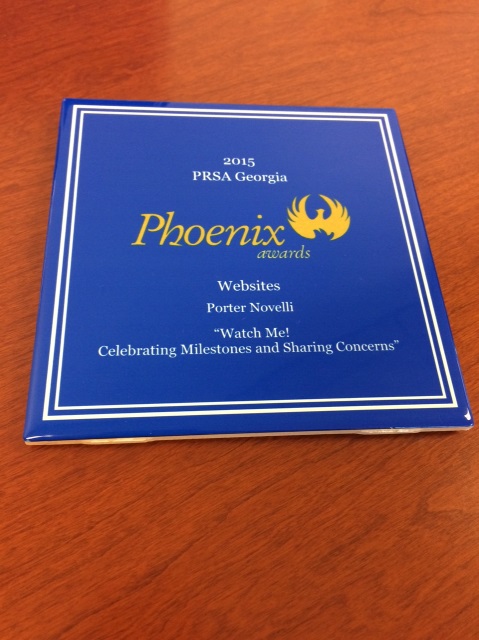 At the 2015 Public Relations Society of America Phoenix Awards, Porter Novelli won an Award of Excellence in the websites-external category for the Learn the Signs. Act Early. Watch Me! Celebrating Milestones and Sharing Concerns website. Of the many submissions, Porter Novellli was one of two to win a Phoenix Award in this category. Children's Healthcare of Atlanta won the other Phoenix Award for their 100-Year Legacy Website. At the 2015 Public Relations Society of America Phoenix Awards, Porter Novelli won an Award of Excellence in the websites-external category for the Learn the Signs. Act Early. Watch Me! Celebrating Milestones and Sharing Concerns website. Of the many submissions, Porter Novellli was one of two to win a Phoenix Award in this category. Children's Healthcare of Atlanta won the other Phoenix Award for their 100-Year Legacy Website.
Act Early Forum Fall Webinar: Be A Part of Learn the Signs. Act Early. with Promising Practices!

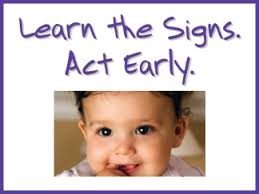 Join the Act Early Network on Monday, December 14 at 2p-3pm ET for the Fall Act Early Forum Webinar to find out what works in helping communities to learn the signs of DD/ASD and act early! Learn the Signs. Act Early. Promising Practices is a collection of locally inspired models and activities aiming to improve the early identification of developmental disabilities and Autism that were implemented and evaluated to varying degrees in programs and communities. Act Early Network members can help increase the reach of the LTSAE initiative by selecting a Promising Practice activity to deliver to a target audience you have access to, such as early care and education providers, parents of newborn babies and young children, pediatric and primary care providers, and/or residency program directors. Join the Act Early Network on Monday, December 14 at 2p-3pm ET for the Fall Act Early Forum Webinar to find out what works in helping communities to learn the signs of DD/ASD and act early! Learn the Signs. Act Early. Promising Practices is a collection of locally inspired models and activities aiming to improve the early identification of developmental disabilities and Autism that were implemented and evaluated to varying degrees in programs and communities. Act Early Network members can help increase the reach of the LTSAE initiative by selecting a Promising Practice activity to deliver to a target audience you have access to, such as early care and education providers, parents of newborn babies and young children, pediatric and primary care providers, and/or residency program directors.
Join us to hear from the CDC's LTSAE team, LTSAE Ambassadors, and Act Early Network members and partners who developed and implemented effective Promising Practices using very modest resources. There will be ample time for questions and discussion on the Promising Practices that interest you! Register today to learn from the Act Early change agents and to take action with Learn the Signs. Act Early! Please click here to register for the webinar.
|
News from the Act Early Network California Autism and Professional Training and Information Network (CAPTAIN)
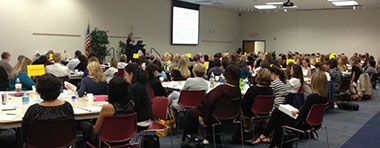
In partnership with autism experts and leading medical institutions, GeneticaLens, a New York-based information California Autism Professional Training and Information Network (CAPTAIN) is a multiagency network established as a result of California's participation in the CDC Act Early Summit in 2009 where stakeholders from the California Departments of Education, Developmental Services , Family Resource Centers (FRC) and the UCEDDs, developed a multiyear plan to increase awareness of Autism Spectrum Disorders (ASD) and Evidence Based Practices (EBPs). From 2010 - 2012, under funding from OSEP's National Professional Development Center for Autism Spectrum Disorders (NPDC - ASD) Training and Technical Assistance Grant, a state leadership team to support the implementation of EBPs at six demonstration sites was recruited. Following the grant, this team, along with demonstration site staff, formed CAPTAIN.
Since 2012, over 400 members from schools, regional centers and FRCs have been recruited. The goals of CAPTAIN are to:
1. Increase awareness of ASD and EBPs through systematic information dissemination.
2. Increase implementation of EBPs in schools and community settings.
3. Increase interagency communication and collaboration to leverage resources and support critical transition periods, including early identification, Part C to and from school to adult services.
To find out more about CAPTAIN, please visit the website at www.captain.ca.gov or contact the state Act Early Ambassadors (Fran Goldfarb, [email protected] and Debbie Sarmento, [email protected]).
North Carolina Autism State Implementation Grant Collaborates with State Early Interventionists for Autism Training
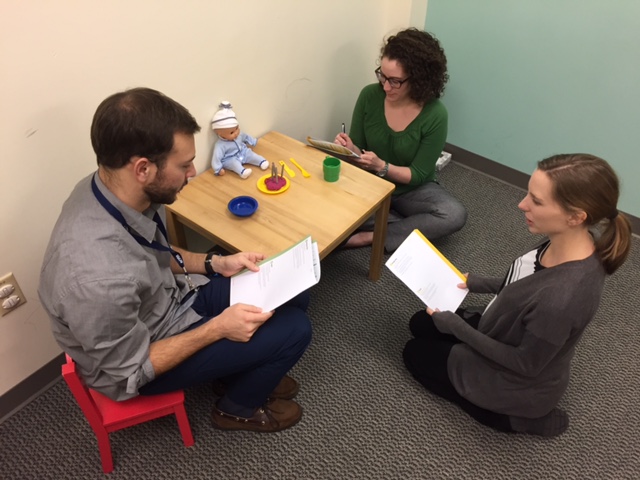 The North Carolina Autism State Implementation Grant (NC-SIG) trains early interventionists on autism diagnostic assessments and intervention. Targeted efforts have been made with the state's 16 Children's Developmental Services Agencies (CDSAs), which provide early intervention services to families across North Carolina's 100 counties. The NC Division of Public Health's Infant-Toddler Program funds the CDSAs. The North Carolina Autism State Implementation Grant (NC-SIG) trains early interventionists on autism diagnostic assessments and intervention. Targeted efforts have been made with the state's 16 Children's Developmental Services Agencies (CDSAs), which provide early intervention services to families across North Carolina's 100 counties. The NC Division of Public Health's Infant-Toddler Program funds the CDSAs.
Nearly 60 CDSA early interventionists will be trained through workshops and webinars by conclusion of the NC-SIG in 2016. Dr. Pamela DiLavore, Associate Director of the Chapel Hill TEACCH Center and NC-SIG team member, has provided three in-person trainings and two follow-up webinars on the Autism Diagnostic Observation Schedule, 2nd Edition. Nearly 40 CDSA interventionists participated in Dr. DiLavore's trainings. In addition, Dr. Lauren Turner Brown, Assistant Director of the University of North Carolina TEACCH Autism Program and NC-SIG team member, will be presenting two, two-day workshops on the Family Implemented TEACCH for Toddlers program. With the support of the NC-SIG, 20 CDSA interventionists will participate in these trainings.
The NC-SIG has conducted follow-up evaluations with training participants to determine the sustainability of these efforts for systems-level change. These evaluations have indicated a positive increase in early interventionists' comfort and skill level with autism diagnostic tools. For more information, please click here. Questions can be directed to Emily Kerthcher at [email protected], who is the Project Coordinator NC Autism State Implementation Grant.
Invitation to Evaluate Free Developmental Milestones Training for Early Care and Education Professionals
 "Watch Me! Celebrating Milestones and Sharing Concerns" is a free, 1-hour, web-based CEU course from CDC that helps early care and education providers identify and monitor developmental milestones of children in their care and share observations with parents. "Watch Me! Celebrating Milestones and Sharing Concerns" is a free, 1-hour, web-based CEU course from CDC that helps early care and education providers identify and monitor developmental milestones of children in their care and share observations with parents.
- Watch Me! online training modules were developed by the Centers for Disease Control and Prevention (CDC) in partnership with National Association for the Education of Young Children (NAEYC) and other national early childhood partners
- Pairs with the FREE Learn the Signs. Act Early. parent education materials from the CDC
- Designed to help you talk to parents about how their children are reaching developmental milestones and what to do if there is a concern
- Evaluation conducted through the Waisman Center, UW-Madison
- Available to anyone with access to the internet
How can you participate? Visit: http://www.actearly.wisc.edu/training.php
Step 1: Pre-training survey
Step 2: Watch Me! Training
Step 3: Post-training survey
Final Step: 3-months later - Follow-up survey.
If you have questions please feel free to contact Alex Puk at [email protected] or 608-890-0123. Alex Puk is the Project Coordinator, WI-IN Evaluation of Learn the Signs. Act Early. at Waisman Center, UW-Madison. Gail Chodron, Ph.D. is the Principal Investigator and CDC Act Early Ambassador to Wisconsin at the Waisman Center, UW-Madison.
Systemwide Solutions for Developmental-Behavioral Concerns
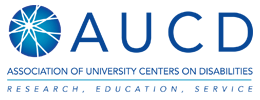 A new article in Pediatrics proposes that every U.S. state needs: 1) a family-friendly, screening and care coordination entity, 2) comprehensive, tiered, and equitable assessments for "at-risk" or referred children, 3) universal access to high-quality early learning or preschool programs, and 4) continuous accountability for the early detection process from birth to 5 years, and this includes an outcome-based metric for kindergarten readiness. Leaders in health, education, and social service sectors must boldly address our nation's capacity crisis in a system-wide manner. US early learning (especially IDEA Part C) services must become more equitable, efficient, and effective so that the focus is always on the developmental-behavioral needs of the child. More information can be found at AUCD's blog post here. A new article in Pediatrics proposes that every U.S. state needs: 1) a family-friendly, screening and care coordination entity, 2) comprehensive, tiered, and equitable assessments for "at-risk" or referred children, 3) universal access to high-quality early learning or preschool programs, and 4) continuous accountability for the early detection process from birth to 5 years, and this includes an outcome-based metric for kindergarten readiness. Leaders in health, education, and social service sectors must boldly address our nation's capacity crisis in a system-wide manner. US early learning (especially IDEA Part C) services must become more equitable, efficient, and effective so that the focus is always on the developmental-behavioral needs of the child. More information can be found at AUCD's blog post here.
Examining Parents' Experiences and Information Needs Regarding Early Identification of Developmental Delays: Qualitative Research to Inform a Public Health Campaign
 The purpose of this study was to assess the approach and materials of CDC's "Learn the Signs. Act Early." health education campaign, which aims to improve awareness of developmental milestones and early warning signs of developmental delay among parents of young children. Two phases of qualitative research were conducted. Focus groups assessed the campaign's objectives by exploring the experiences of parents with children who have developmental delays or disabilities to determine facilitators of and barriers to identification. In-depth interviews were conducted with parents of typically developing children, who reviewed campaign materials and provided feedback on appropriateness, appeal, and clarity with regard to the campaign's objectives. The purpose of this study was to assess the approach and materials of CDC's "Learn the Signs. Act Early." health education campaign, which aims to improve awareness of developmental milestones and early warning signs of developmental delay among parents of young children. Two phases of qualitative research were conducted. Focus groups assessed the campaign's objectives by exploring the experiences of parents with children who have developmental delays or disabilities to determine facilitators of and barriers to identification. In-depth interviews were conducted with parents of typically developing children, who reviewed campaign materials and provided feedback on appropriateness, appeal, and clarity with regard to the campaign's objectives.
Results revealed that parents were typically the first to express concern about their child's development, and most talked with their child's health care provider. Two categories of health care providers emerged: those who proactively asked about a child's development, used tools to facilitate conversations, and made referrals, and those who did not ask about development, told parents to "wait and see," and did not provide information about services and supports. Please click here to access the full article.
Parental Report of the Diagnostic Process and Outcome: ASD Compared with Other Developmental Disabilities
 Parents report that the process of getting an autism spectrum disorder (ASD) diagnosis is arduous, lengthy, and fraught with difficulties. This analysis of the Pathways survey data set examined the experiences of parents who said, at the time of the survey, that their child currently had ASD compared with parents who said, at the time of the survey, that their child currently had some other developmental disability. Despite substantially earlier parental concerns about their child's development, the ASD group (n= 1,420) received their current diagnosis about 7 months later (M age at diagnosis = 62.8 months, SE= 1.62) on average, than did children in the group diagnosed with other developmental delay (n= 2,098, M age at diagnosis = 55.4 months, SE= 2.13). Parents in the "Current ASD" group were more likely to report that the health professional said nothing was wrong or that the child might "grow out of it," emphasizing a common parental complaint. Continued efforts to improve parents' experience of the diagnostic process are warranted. To read the entire article, please click here. Parents report that the process of getting an autism spectrum disorder (ASD) diagnosis is arduous, lengthy, and fraught with difficulties. This analysis of the Pathways survey data set examined the experiences of parents who said, at the time of the survey, that their child currently had ASD compared with parents who said, at the time of the survey, that their child currently had some other developmental disability. Despite substantially earlier parental concerns about their child's development, the ASD group (n= 1,420) received their current diagnosis about 7 months later (M age at diagnosis = 62.8 months, SE= 1.62) on average, than did children in the group diagnosed with other developmental delay (n= 2,098, M age at diagnosis = 55.4 months, SE= 2.13). Parents in the "Current ASD" group were more likely to report that the health professional said nothing was wrong or that the child might "grow out of it," emphasizing a common parental complaint. Continued efforts to improve parents' experience of the diagnostic process are warranted. To read the entire article, please click here.
Early Childhood Development Resources

New ASD Data from NHIS
On Nov. 13, CDC's National Center for Health Statistics today issued a report on autism spectrum disorder (ASD) prevalence based on a survey of parents. That estimate - 1 in 45 children - is based on National Health Interview Survey data where parents were asked whether their child had ever been diagnosed with autism or a related disorder. The report, "Estimated Prevalence of Autism and Other Developmental Disabilities Following Questionnaire Changes in the 2014 National Health Interview Survey," is available here: http://www.cdc.gov/nchs/data/nhsr/nhsr087.pdf.
CDC's Autism and Developmental Disabilities (ADDM) Network
The ADDM Network's ongoing tracking system helps provide a more complete picture of ASD in the United States. The ADDM Network further enriches our understanding by working with communities across the United States to collect information on specific characteristics of children with ASD and track changes in these communities and within different subgroups over time. In March 2014, CDC's ADDM Network estimated that 1 in 68 children had been identified with ASD. These estimates from the ADDM Network are based on data collected from health and special education records of children living in 11 areas of the United States during 2010. CDC will continue to update ASD prevalence based on findings from the ADDM Network. The next ADDM ASD prevalence report is expected to be published in spring 2016. For more information, visit www.cdc.gov/autism.
The Data Resource Center for Child & Adolescent Health
The mission of the Data Resource Center (DRC) is to take the voices of parents, gathered through the National Survey of Children's Health (NSCH) and the National Survey of Children with Special Health Care Needs (NS-CSHCN), and share the results through this free online resource. Easy access to children's health data allows researchers, policymakers, family advocates and consumers to work together to promote a higher quality health care system for children, youth and families.
|


